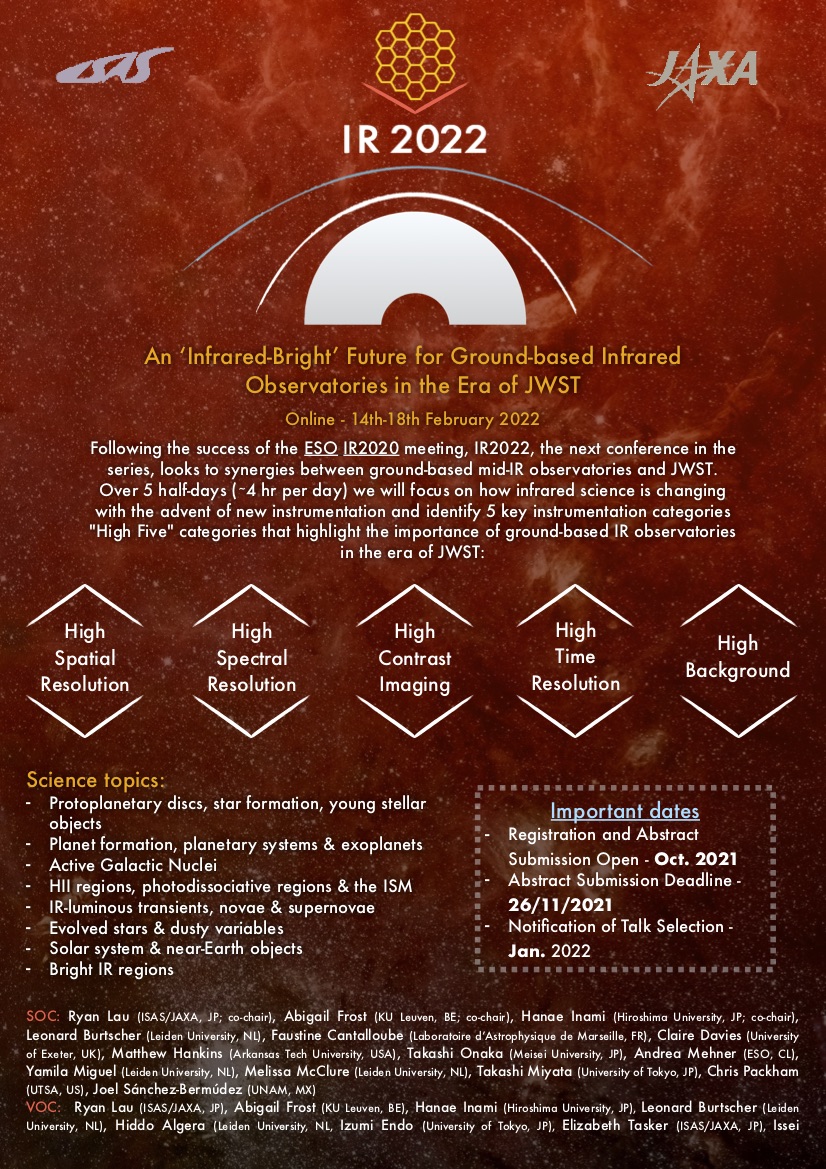Welcome to the IR2022 Conference Webpage

17 Feb 2022 Update. We are excited to announce the IR2022 Public Talk Series in collaboration with Haus der Astronomie. The public talks will be given by IR2022 participants from around the world and will take place between 21 - 25 February 2022.
14 Feb 2022 Update. We are pleased to share the IR2022 Abstract Booklet (sorted alphabetically by last name). We also provide a version of the IR2022 Abstract Booklet sorted by presentation order.
9 Feb 2022 Update. Information on the IR2022 social events have been updated and are shown in the Agenda. The Virtual Reality Info has also been updated, and we have updated the Useful Links page to include a IR2022 Zoom Background that you are welcome to use throughout the meeting.
24 Jan 2022 Update. The IR2022 Agenda has been updated and new pages with the Participant List, Presenter Instructions, and Virtual Reality Info have been added.
24 Dec 2021 Update. In order to accommodate the early career researchers who might be affected by the cancellation of the 239th American Astronomical Society Meeting, the abstract submission deadline has now been moved to Friday January 7, 2021 for early career researchers.
17 Nov 2021 Update. The abstract submission deadline has now been moved by three weeks to Friday December 17, 2021.
12 Nov 2021 Update. The SOC/LOC would like to ensure that everyone who needs to access this meeting, will be able to do so. We are therefore happy to announce that we are able to offer financial help to those whose internet connectivity would otherwise not allow them to participate in IR2022. The registration form has been updated with a new field for those who would like to apply for this financial support. More information can also be found in the Accessibility page.
Motivation Narrative. Ground-based infrared observations allow us to probe the embedded Universe, from discs surrounding forming stars and to the structures surrounding galactic centres. While the best sensitivity is found in space, observing from the ground is crucial to obtaining the spatial and spectral resolution required to investigate important science questions, such as the contents of exoplanetary atmospheres and the dusty shells of dying distant stars. Throughout this decade, ground based thermal-infrared (3-30 microns) observing will reach new heights, with new instrumentation at existing facilities (e.g. VLTI, LBTI) and the next generation of telescopes coming on-line such as the 6.5-m University of Tokyo Atacama Observatory and the highly anticipated 30-m class telescopes. The timing for these advances in ground-based observations could not be better scheduled, with the JWST Cycle 1 science programs selected and its launch on the horizon. At IR 2022, we look to this infrared-bright future and focus on how synergy between current and incoming ground based instrumentation and the JWST can best maximise our understanding of the Universe in the infrared.
Key science cases that highlight the role of ground-based IR observatories in the era of JWST can be arranged in the following “High Five” categories:
- High spatial resolution, high spectral resolution, high contrast imaging:
- Star/planet formation, Exoplanets, Protoplanetary disks (PPD), Active galactic nuclei (AGN), young stellar objects (YSOs), Planetary nebulae, HII regions and PDRs
- High cadence/time resolution:
- Obscured supernovae (SNe) and novae, IR-luminous transients (ILRT/LBV, LRN, SPRITE), massive/evolved stars and dusty variables (AGB, WC, RSG, RCB), Near Earth Objects and distant asteroids
- High background regions and bright IR-bright sources:
- Galactic center, Eta carina, Orion, Solar system planets
IR2022 is hosted by the JAXA Institute of Space and Astronautical Science and will be held online over 5 half-day sessions between Monday February 14 and Friday February 18. Registration for IR2022 is free. IR2022 will utilize similar conference platforms as IR2020 such as Zoom, Slack, and gather.town (more details on the conference platforms will be provided at a later date). The tentative 4.5-hour duration for each day of IR2022 is:
- 1300 - 1730 Coordinated Universal Time
- 2200 - 0230 Japan Standard Time
- 1400 - 1830 Central European Time
- 0800 - 1230 Eastern Standard Time
- 0500 - 0930 Pacific Standard Time